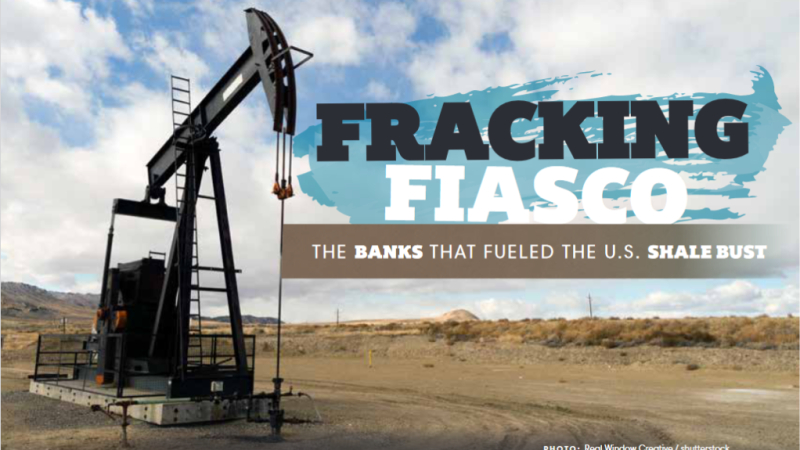Fracking Fiasco: The banks that fueled the U.S. shale bust

San Francisco – A new report by Rainforest Action Network (RAN) and Oil Change International shows how major banks have continued pouring money into fracking companies in recent years despite numerous warnings that the sector was financially unsustainable — on top of the well-documented environmental, health, and climate impacts of the industry.
RAN research reveals that financing for the fracking industry is highly concentrated, with Wells Fargo the biggest banker of U.S. frackers since the Paris Climate Agreement was adopted, and JPMorgan Chase a standout second place. The fracking industry has been hit hard by the pandemic, with dozens of bankruptcies so far this year, but its troubles long predate the coronavirus.
“The fracking sector has become a poster child for the serious problems facing the U.S. oil and gas industry,” said Alison Kirsch, lead researcher for RAN’s climate and energy program. “The disastrous climate consequences of fracking, as well as its horrific community health impacts, are well known, but by continuing to pour billions of dollars into this dying sector, banks are also injecting a real level of systemic risk into the U.S. economy.”
“Banks and asset managers have enabled the oil and gas industry’s destructive boom and bust cycles for generations. Our planet cannot afford another oil boom. We need regulators, shareholders, and the public to force banks to consider the climate impact and demand they stop financing destructive and unstable business activities,” said Rebecca Concepcion Apostol, U.S. Program Director at Oil Change International. “Our collective health continues to be at risk, and we cannot let banks fund another oil boom when this pandemic passes.”
“The money that these banks are pouring into the troubled fracking industry has had real impacts on communities in the shale fields of my state since the fracking boom began and will continue to have impacts long after the last well is drilled. Continuing to prop up an industry that was failing even before the pandemic hit means more devastation that will be on the backs of Pennsylvanians to clean up,” said Karen Feridun, founder of Berks Gas Truth, a grassroots citizens’ group fighting to bring an end to unconventional natural gas drilling in Pennsylvania.
The 51 U.S. fracking-focused companies analyzed in this report received USD 224 billion in financing since the Paris Agreement was adopted (1/1/16-8/31/20), with almost 40% of that financing coming from JPMorgan Chase and Wells Fargo alone. Combined with Citi and Bank of America, these four major Wall Street banks provided over half of financing for U.S. fracking-focused companies since Paris.
The fracking companies analyzed have USD 120 billion in debt set to mature from 2021 to 2025, much of which now seems unlikely to ever be repaid. In fact, 72% of the bonds issued by these companies were rated non-investment grade when brought to market, compared to only 17% of U.S. bonds issued economy-wide. Analysis of funding over time shows a significant change from 2016 onwards in the mix of the funding streams from banks for frackers. Equity issuances — almost half of the financing in 2016 — craters to 8% of financing in 2017, and remains in the single digits each subsequent year. Bond issuances drop from 40% of financing in 2017 to 17% and 14% in the 2018 and 2019 (with loans taking up the slack), before spiking back up to 48% in 2020 to date. This finding is consistent with multiple reports in the financial media that equity investors were finally waking up to the basic flaws in the industry’s debt-soaked business model and its inability to turn a profit — yet despite this, banks continued to shower the sector with loans and bonds.
This analysis quantifies financing provided to U.S.-focused frackers: companies with over 40% of their production over the last decade in U.S. shale, and where that U.S. shale production was over 100 million barrels. In total, this research analyzed financing for 51 historical companies. Since some have since been acquired by others on the list, it amounts to 48 current companies. For the full list of fracking companies included, see the methodology section of the report.
